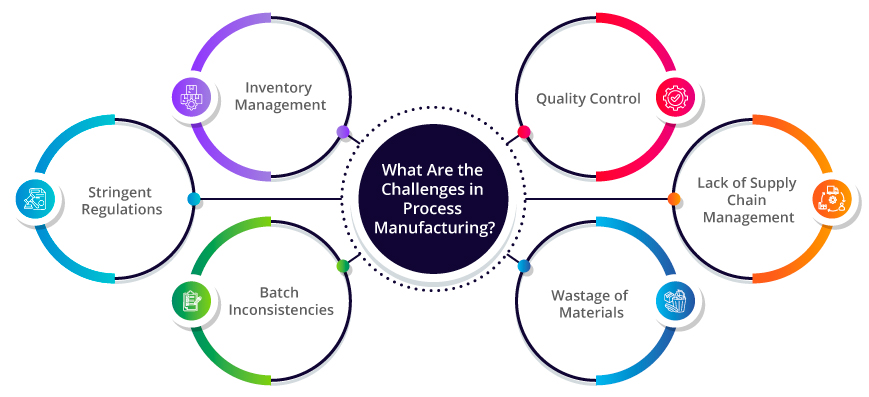In today’s ever-evolving process manufacturing industry, manufacturers are likely facing complex manufacturing challenges, whether they are producing food items, cosmetics, or medicines. On a day-to-day basis, process manufacturers face challenges from supply chain disruptions and stringent industry regulations to batch inconsistencies and quality issues. Process manufacturers must navigate these complex manufacturing industry challenges.
Manufacturing challenges can lead to increased costs, reduced profit margins, production delays, and a high risk of legal action. Manufacturing companies can leverage the challenges to their benefit by crafting inventive solutions that enhance their competitive edge. The solution to these complexities is the right ERP software to operate efficiently and achieve long-term success.
The right enterprise resource planning (ERP) software can be transformative in the face of many manufacturing challenges. Let’s delve into these challenges and discover how process manufacturers can address these pain points with the right ERP Software.
What Are the Challenges in Process Manufacturing?

Inventory Management
Due to the perishable nature of the product, process manufacturers need to control inventory more closely. There are higher chances of products expiring because of their short shelf life. This makes it important to have insights into the inventory details so the product with a close expiry date is used first in production. Process manufacturers need to ensure that products are optimally stored in the proper required condition and handled correctly based on their nature.
Maintaining inventory levels and managing raw materials, intermediates, and finished goods can be challenging in process manufacturing. They need to have real-time visibility into stock levels, and their location for proper production planning to avoid production and shipment delays. Lack of visibility into the inventory availability can affect operational efficiency and costs.
ERP software provides the ability to track/trace lots, forecast demand, manage inventory, and monitor stock levels in real-time so that inventory shortages and surpluses can be controlled based on production targets to meet dynamic customer and market demands. Proper storage and correct handling can be effectively managed depending on the nature of the product.
Stringent Regulations
Managing industry standards and compliance requirements can be challenging for process manufacturers as they operate in heavily regulated industries. They need to adhere to strict industry, regulatory, and compliance requirements. Process manufacturers need to strictly follow the guidelines and regulations of the bodies like Food and Drug Administration (FDA), Federal Trade Commission (FTC), and Occupational Health and Safety Administration (OSHA) that are established to protect consumers.
Manufacturers failing to adhere to industry-specific rules and regulations face severe penalties, reputational damage, and loss. This makes it crucial for manufacturers to track the product and manufacturing process of the company to meet compliance requirements at every stage of manufacturing set by the regulatory bodies. For instance, chemical manufacturers producing chemical components must comply with environmental regulations such as hazardous waste disposal and pollution control rules.
Process manufacturing ERP software ensures that the product meets compliance requirements at all stages of the production process. If any regulations are revised, ERP software can help keep every team updated by keeping the information at a central location, ensuring the product complies with new rules and regulations.
Batch Inconsistencies
Process manufacturing involves formulation management, which requires precise control over the formula or recipe. Process manufacturers are required to calculate exact quantities of ingredients for consistent batch quality. In process manufacturing, complex unit conversions are also involved while calculating the ingredient’s quantities and formula size. Product with consistent quality Inaccurate calculation of material quantity with the wrong composition can lead to inconsistent batch production, which can have severe consequences.
Consistent quality ensures that every time a consumer purchases a product, it meets their expectations in terms of performance, durability, and overall experience. This reliability fosters brand loyalty, as consumers are more likely to return to a brand they trust to deliver a consistent product.
With the right ERP technology, you can record and adjust the formula and ingredients in weight or volume with accurate calculations, and conversions, eliminating manual errors. This results in consistently scaling up production while maintaining the product’s high standards. Process manufacturers can easily maintain proper documentation of processes, and track ingredients, process steps, and production orders with process manufacturing ERP software.
Quality Control
In process manufacturing, regular quality checks are essential at all stages of production, from receiving raw materials from suppliers to shipping final finished goods. Process manufacturers must ensure the product meets customer requirements and is defect-free. If any quality issues arise, they must be able to identify defects and control deviations; otherwise, it can lead to cost inefficiency and heavy chargebacks.
Manufacturers must conduct quality control checks at multiple stages with proper inspection. If quality problems in manufacturing and deviations are not controlled, product recalls can be difficult and companies have to deal with elevated production costs, reduced brand trust, increased returns, and complaints.
Process manufacturing ERP software with quality management capabilities can automate quality control testing at multiple stages. This allows process manufacturers to ensure quality and safety standards are followed at every step of the production process, from receiving to shipment. If any discrepancy is found in the test results, it’s easy to identify and investigate the issue and take necessary actions promptly to eliminate it with the help of non-conformance (NC) and corrective and preventive action (CAPA) capability. This will ensure the delivery of high-quality products to consumers, increasing the manufacturer’s reliability.
Lack of Supply Chain Management
Process manufacturers often work with multiple vendors and suppliers. This makes it essential to make them ensure that suppliers meet the supply chain compliance and adhere to regulatory and quality requirements. To maintain these standards, process manufacturers must be able to track and evaluate vendors to make informed purchase decisions.
Any disruptions in the supply chain, from receiving raw materials from suppliers to delivering final finished goods to consumers, can hinder manufacturing operations and negatively impact the company’s profit ratio. Even minor disruption from the suppliers can lead to significant supply chain issues, highlighting the critical need for continuous monitoring and assessment of supplier performance.
Process manufacturing ERP software provides visibility into suppliers’ performance. It enables you to track suppliers from sourcing raw materials to shipping finished goods. This helps you make data-driven decisions, foster communication with suppliers by providing feedback about their performance, and ensure the products and services they provide meet your company’s requirements.
Wastage of Materials
Poor recipe management and control over ingredients can result in ingredient loss. As we talked about the perishable nature and short shelf life of the inventory, it should be utilized effectively to reduce the wastage of materials. Process manufacturers must be able to track the loss/overage percentage of formula and specific ingredients for a cost-efficient process.
For instance, food manufacturer ABC Cookie Co. tracks recipe and ingredient losses to improve efficiency. They find a 5% overall loss in production, adjust processes to minimize it to 3% and optimize ingredient usage for cost savings and consistent quality. If process manufacturers do not monitor the production process closely then it can lead to excessive waste. High levels of waste may necessitate rework or lead to increased scrap rates, further impacting production schedules and costs.
Process manufacturers can make cost-effective decisions with the right ERP software. You can manage ingredient yield, and loss/overage, track production losses, and utilize inventory based on its expiry date and perishable nature. This reduces material wastage through real-time visibility into the details of stock items.
How can Acumatica’s cloud-based ERP and eWorkplace Apps’ Process Manufacturing Suite help?
The right ERP system can help process manufacturers manage inventory, accurate formula/recipe calculation, planning, and scheduling, material requirements, track suppliers, avoid heavy chargebacks for non-compliance, and address problems in the manufacturing industry. Adopting such technology is no longer an option but a necessity for process manufacturers aiming to stay competitive in today’s dynamic market.
Acumatica is a modern cloud-based ERP system for manufacturers and distributors. General ERP software can only help overcome some of the challenges process manufacturers face. Acumatica with eWorkplace Apps’ Process Manufacturing Suite is robust ERP software tailored to their unique business needs. With Acumatica and eWorkplace Apps’ Process Manufacturing Suite, process manufacturers can scale, speed up production, and overcome complex challenges, from managing inventory to meeting compliance requirements, while increasing profitability in overall operations.
Contact us or your Acumatica partner to learn more.
Contact Us
"*" indicates required fields













